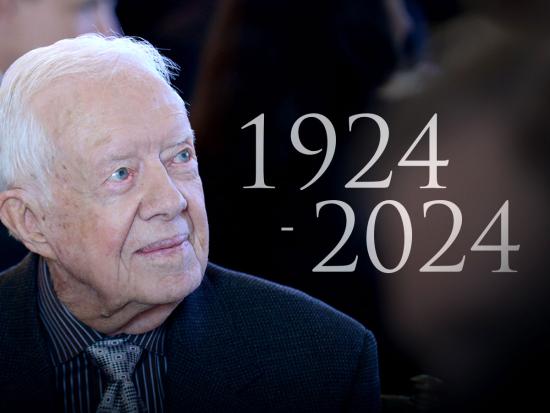
Jimmy Carter, 39th President of the United States, has died at the age of 100. Carter will be remembered for his humanitarian work, kind demeanor, and lifelong dedication to service.
James Earl Carter Jr. was born October 1, 1924, in Plains, Georgia, the first U.S. president to be birthed in a hospital. He was the eldest son of Bessie Lillian and James Earl Carter Sr. The family moved several times during Carter’s infancy. The Carters settled on a dirt road near Archery, which impoverished African American families almost entirely populated. Although Carter’s father was staunchly pro-segregation, he allowed his son to befriend the black farmhands’ children. Carter was an enterprising teenager who was given his own acre of Earl’s farmland, where he grew, packaged, and sold peanuts. He also rented out a section of tenant housing that he had purchased.
Carter graduated from the United States Naval Academy in 1946 with a Bachelor of Science degree and joined the United States Navy, serving on numerous submarines. While at the academy, Carter fell in love with Rosalynn Smith, a friend of his sister Ruth. The two married shortly after his graduation in 1946. Following his graduation, Carter was commissioned as an ensign.
After his father died in 1953, he left his naval career and returned home to Plains, where he assumed control of his family’s peanut-growing business. He inherited comparatively little due to his father’s forgiveness of debts and the division of the estate amongst himself and his siblings. Nevertheless, his ambition to expand and grow the family’s peanut farm was fulfilled.
During this period, Carter was encouraged to oppose racial segregation and support the growing civil rights movement. He became an activist within the Democratic Party. From 1963 to 1967, Carter served in the Georgia State Senate and, in 1970, was elected as the governor of Georgia, defeating former Governor Carl Sanders in the Democratic primary. He remained as governor until 1975. Despite being a dark-horse candidate who was generally unknown outside of Georgia, he won the 1976 Democratic presidential nomination. In the 1976 presidential election, Carter ran as an outsider and narrowly defeated incumbent Republican President Gerald Ford.
On his second day in office, Carter issued Proclamation 4483, pardoning all Vietnam War draft evaders. During his term, two new cabinet-level departments—the Department of Energy and the Department of Education—were established. He created a national energy policy that included conservation, price control, and new technology. Carter pursued the Camp David Accords, the Panama Canal Treaties, and the second round of Strategic Arms Limitation Talks (SALT II).
On the economic front, he confronted stagflation, an endless combination of high inflation, high unemployment, and slow growth. The end of his presidential tenure was marked by the 1979–1981 Iran hostage crisis, the 1979 energy crisis, the Three Mile Island nuclear accident, the Nicaraguan Revolution, and the Soviet invasion of Afghanistan. In response to the attack, Carter escalated the Cold War when he ended détente, imposed a grain embargo against the Soviets, enunciated the Carter Doctrine, and led a 1980 Summer Olympics boycott in Moscow.
He is the only president to have served a full term in office and not have appointed a justice to the Supreme Court. In the 1980 Democratic party presidential primaries, he was challenged by Senator Ted Kennedy but won re-nomination at the 1980 Democratic National Convention. Carter lost the 1980 presidential election to Republican nominee Ronald Reagan in an electoral landslide. Polls of historians and political scientists generally rank Carter as a below-average president. His post-presidential activities have been viewed more favorably than his presidency.
In 1982, Carter established the Carter Center to promote and expand human rights. In 2002, he was awarded the Nobel Peace Prize for his work in co-founding the center. He traveled extensively to conduct peace negotiations, monitor elections, and advance disease prevention and eradication in developing nations. Carter is considered a key figure in the charity Habitat for Humanity. He wrote over 30 books, ranging from political memoirs to poetry while continuing to actively comment on ongoing American and global affairs, including the Israeli–Palestinian conflict.
Carter’s health began to decline in his later years. After a series of falls and surgeries, he entered hospice care at his home in Plains, Georgia, in February 2023. He spent his remaining days surrounded by family and close friends, reflecting on a life of service and faith. He passed away peacefully on December 29, 2024, leaving behind a legacy of compassion, resilience, and dedication to improving the world.
